General Cuong: How will the world be affected when the Afghan government 'changes hands'?
(Baonghean.vn) - To better understand the overall picture in the South Asian country when the US withdraws troops and the Taliban returns to power, Associate Professor, PhD, Major General Le Van Cuong - former Director of the Institute of Strategy and Science, Ministry of Public Security, had some discussions on this issue.
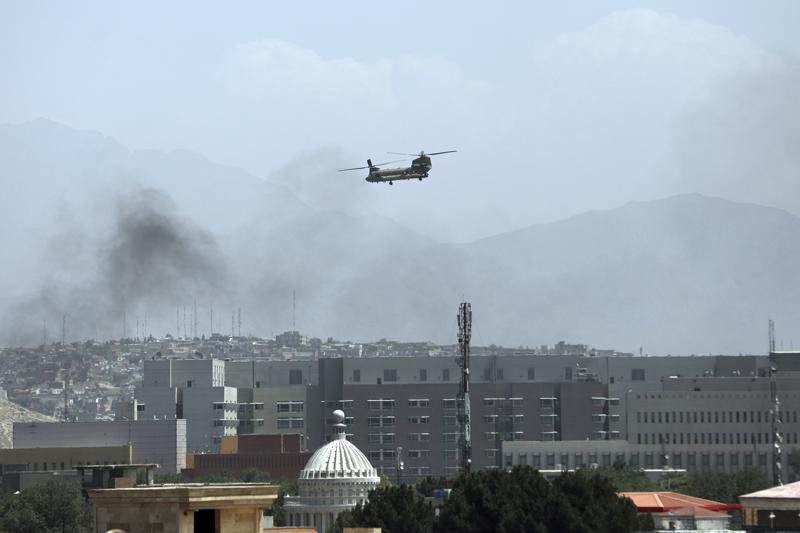 |
| The US sent helicopters to the Embassy in Kabul to evacuate government staff on August 15. Photo: AP |
PV:Major General, some people say that the Taliban's rapid attack and early capture of Afghanistan was due to the US withdrawing its troops, and that this was a major strategic mistake by the United States in the Middle East. What is your comment on this issue?
Major General Le Van Cuong:Withdrawing from Afghanistan was one of the policies outlined in the final years of President Barack Obama's second term, not something that has only been done by the current administration of President Joe Biden. In 2016, when running for election, US presidential candidate Donald Trump declared to 320 million Americans that, if elected, he would withdraw troops from Afghanistan and begin implementing the plan to withdraw from this South Asian country after taking office.
But the dilemma is how to ensure that the Kabul government still exists and is not taken over and destroyed by the Taliban. The Trump administration has conducted direct diplomatic dialogue with Taliban representatives. By February 2020, the two sides signed an agreement, with the most important provision being that the US will withdraw all troops from Afghanistan, and the Taliban will not be allowed to conduct terrorist activities against the Afghan government, will not cooperate with terrorist organizations such as al-Qaeda, IS, ... and this force must dialogue with the government in Kabul, to move towards national reconciliation and form a regime that represents many classes, factions, races, forces, ... including the Taliban.
In early December 2020, as Mr. Trump was nearing the end of his term, the US government withdrew most of its troops from Afghanistan, leaving only 4,500 soldiers. Later that month, another 2,000 US troops returned home. The Trump administration’s rapid withdrawal was fiercely opposed by Congress in Washington, with both parties predicting that it would risk the Taliban returning to take over Kabul. However, Mr. Trump was still determined to act.
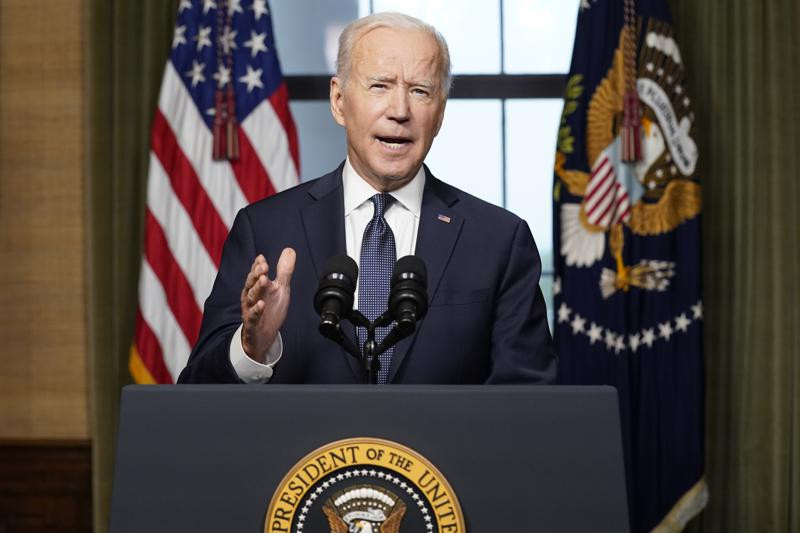 |
| US President Joe Biden speaks at the White House about the withdrawal of US troops remaining in Afghanistan. Biden's team was also stunned by the Taliban's relentless offensive in recent days. Photo: AP |
The incumbent in Washington, Mr. Biden, announced on April 14 that he would withdraw all US military forces from Afghanistan, starting from May 1 and ending on September 11, 2021. Thus, the Joe Biden administration only continues to implement the existing policy of its predecessor. However, due to the urgent situation, the Biden administration has accelerated the progress. Mr. Biden once affirmed that the emerging challenge from China is one of the main reasons for the US to withdraw troops from Afghanistan. Beijing is considered the biggest threat to Washington's interests and global role, so they need to focus all domestic resources, strengthen alliances and friends around the world, and gather forces to deal with it. And so, the Middle East in general and Afghanistan in particular are no longer a priority of the Biden administration.
Regarding this issue, the withdrawal of troops from Afghanistan is correct and necessary. However, the mistake of the US administrations is that they did not prepare a strategy after withdrawing all troops from Afghanistan, and withdrew too quickly, leaving a power vacuum while President Ghani's administration was extremely weak. In fact, even in the political world, American scholars and media were surprised. Even last week, some American scholars still predicted that the government in Kabul would be able to hold on for another 5-7 months. On August 12-13, the US political world could not have imagined that Kabul would be lost in 2 days.
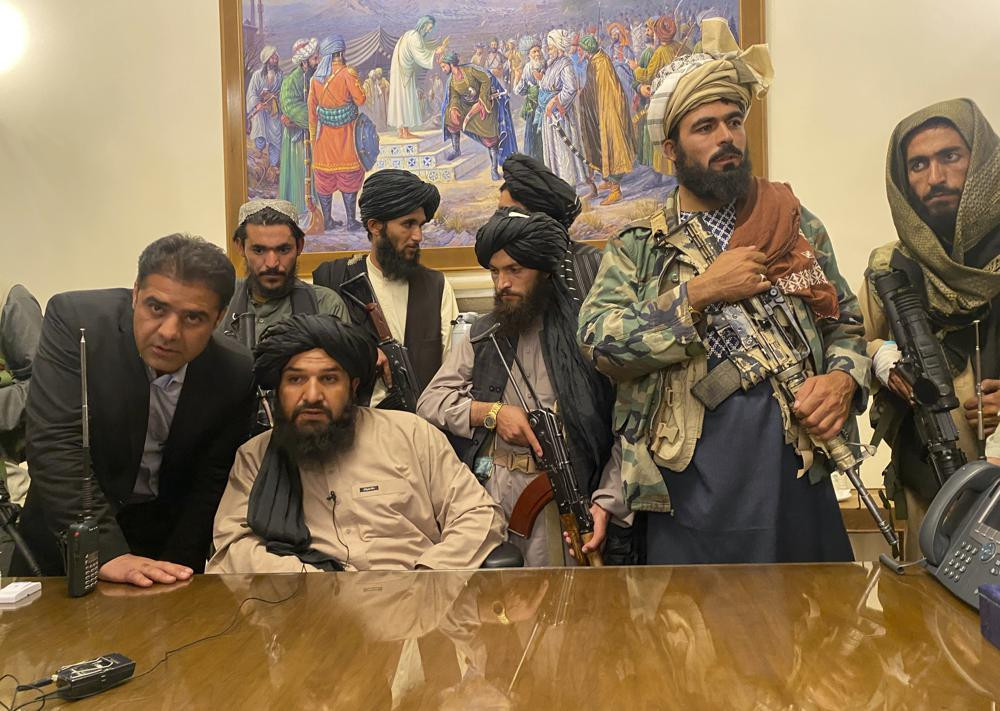 |
| The Taliban took control of the presidential palace after Afghan President Ashraf Ghani fled the country. Photo: AP |
PV:Can you outline the US involvement in Afghanistan over the past 20 years and the immediate consequences of this?
Major General Le Van Cuong:Nearly 20 years ago, on September 11, 2001, al-Qaeda launched a terrorist attack on the Twin Towers - a symbol of America's economic power. The then-President George W. Bush's administration decided to attack Afghanistan directly to destroy al-Qaeda and the Taliban government. According to the Bush administration, the Taliban had nurtured al-Qaeda, and was an implacable enemy that needed to be destroyed. America's longer-term goal was to fight jihadist forces, or the global war on terrorism. In October 2001, the US attacked, using the Tomahawk missile system, and within just 3 weeks the Taliban government collapsed. That victory was not very glorious, but 20 years later, the US was bogged down in the war on terrorism in Afghanistan, then Iraq and Syria. American history will have a thorough summary, but I think, initially we can identify the failure of the US in particular, and NATO in general. In 2 decades, the US has spent 1,000 billion USD on this battlefield. If we add the amount of subsidies for the families of 4,500 dead US soldiers and soldiers injured in Afghanistan, it will amount to about 1,300 billion USD.
The much bigger consequence is that it weakens the US, which is one of the reasons that pushed them into the 2008 financial crisis and the more they get bogged down in Afghanistan, Iraq, and Syria, the more the US's global role and position declines. While the US loses people and money in Afghanistan, China rises strongly, Russia recovers, fundamentally changing the world political situation in a direction unfavorable to the US. If before 2001, the US was an all-powerful superpower with overwhelming power over all opponents, with 800 military bases abroad, US GDP accounted for 21.5% of global GDP, while China was not yet prominent, Russia still faced many difficulties, then by 2021, the role and position of the US has declined significantly, not only economically, but also militarily, politically, diplomatically...
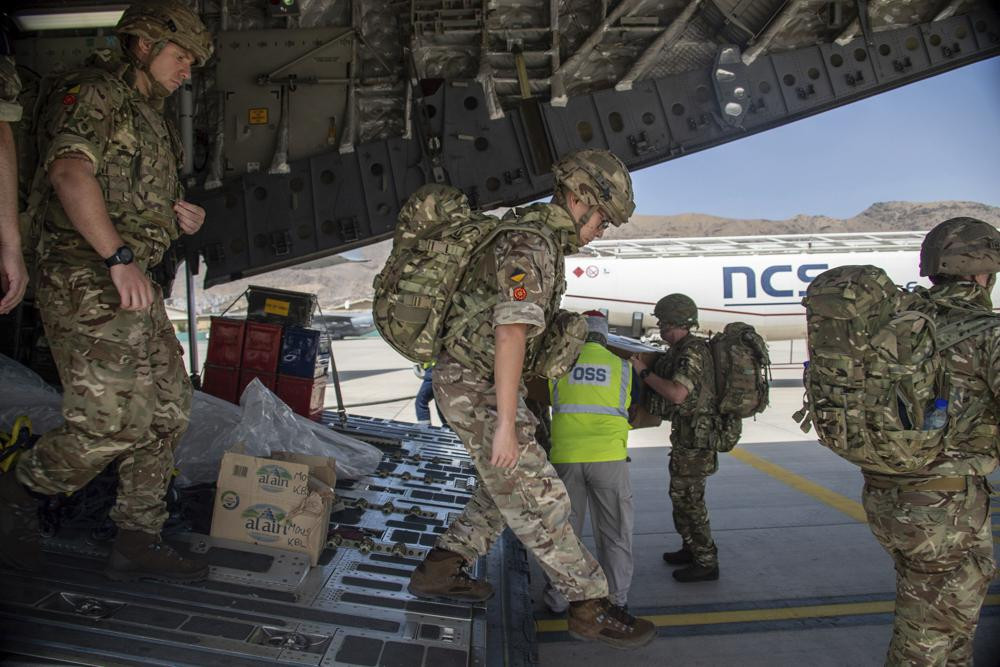 |
| On August 15, the UK sent forces to help evacuate its citizens in Afghanistan amid deteriorating security. Photo: AP |
PV:How do you explain the fact that on August 15, when besieging the capital of Afghanistan, the Taliban did not attack Kabul but called on the Ghani government to surrender unconditionally?
Major General Le Van Cuong:This is a 180-degree turn from the Taliban's previous attitude. I think there are two reasons to explain this. First, the Taliban was sure of victory. By August 13 and 14, although the Taliban force was thinner, its quality was much better than the Ghani government's decrepit army and security forces. In fact, within the Afghan government that has existed for two years now, there have been many factions tearing and fighting each other, making the Taliban realize that there is no need to shed more blood. Second, over the past 20 years, the Taliban has committed too many crimes. In the eyes of the world, this is a notorious terrorist organization. The blood debt is too great, now is not the time to commit more crimes, they need to show a friendly image to the Afghan people in particular, and the world in general, so that they will later be accepted by the international community as an official government of Afghanistan.
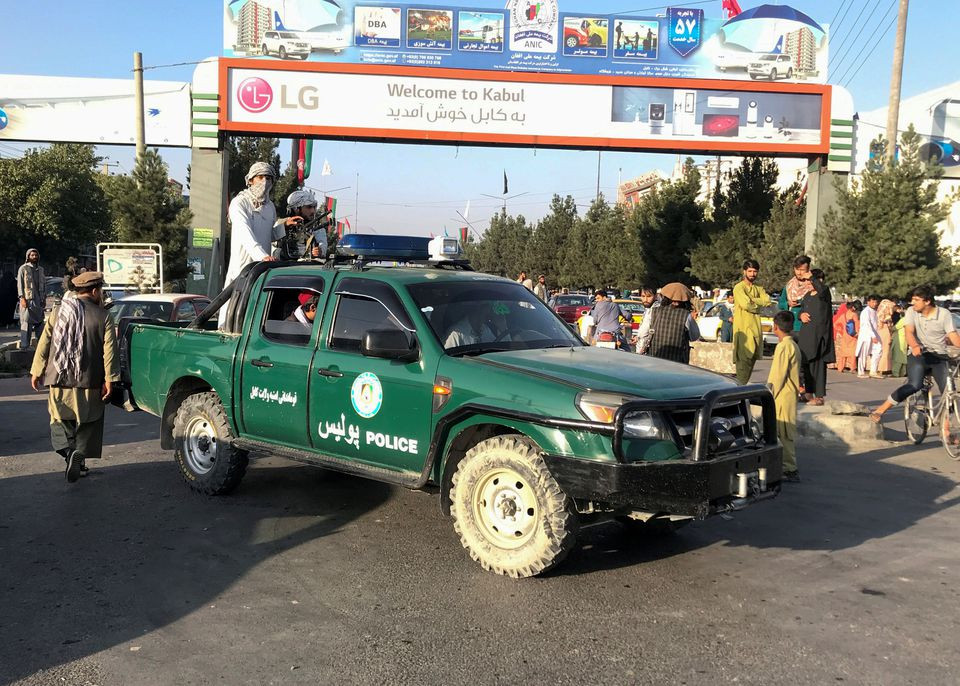 |
| Taliban gunmen drive a police vehicle outside Hamid Karzai International Airport in Kabul, Afghanistan on August 16. Photo: Reuters |
PV:World public opinion is currently very worried about the situation in Afghanistan under the Taliban, fearing the prospect of a bloody massacre and a prolonged civil war. On this issue, what is the Major General's prediction and what challenges await the Taliban?
Major General Le Van Cuong:It is difficult to predict the situation in Afghanistan in the next 5 or 10 years, but it is possible to predict the coming period, until the end of 2021 and the beginning of 2022. I believe that the Taliban's nature will not change, but they will change their external expressions after overthrowing the Kabul government and officially taking power, determined to avoid the bloody massacre to improve the bad image of the past 20 years. Therefore, in the near future, there will be no revenge, bloodbath or civil war. But Afghanistan under the Taliban will be far from stable, because sporadic conflicts will still exist, and the forces loyal to the old government will still be hiding somewhere. Moreover, this is a multi-ethnic country, with many generations of political forces opposing each other for hundreds of years.
The biggest difficulty awaiting the Taliban government is first of all the economy. After 20 years of war, Afghanistan has been exhausted. The main source of funding was previously US aid, then drug trafficking, and the economy was severely devastated. The second difficulty is internal politics. Afghan society is extremely complicated with dozens of different tribes and dozens of opposing political forces. The Taliban, at least for now, must try to resolve internal problems in a harmonious way to have a legitimate, internationally recognized government. Only then can Afghanistan receive external aid to restore its economy.
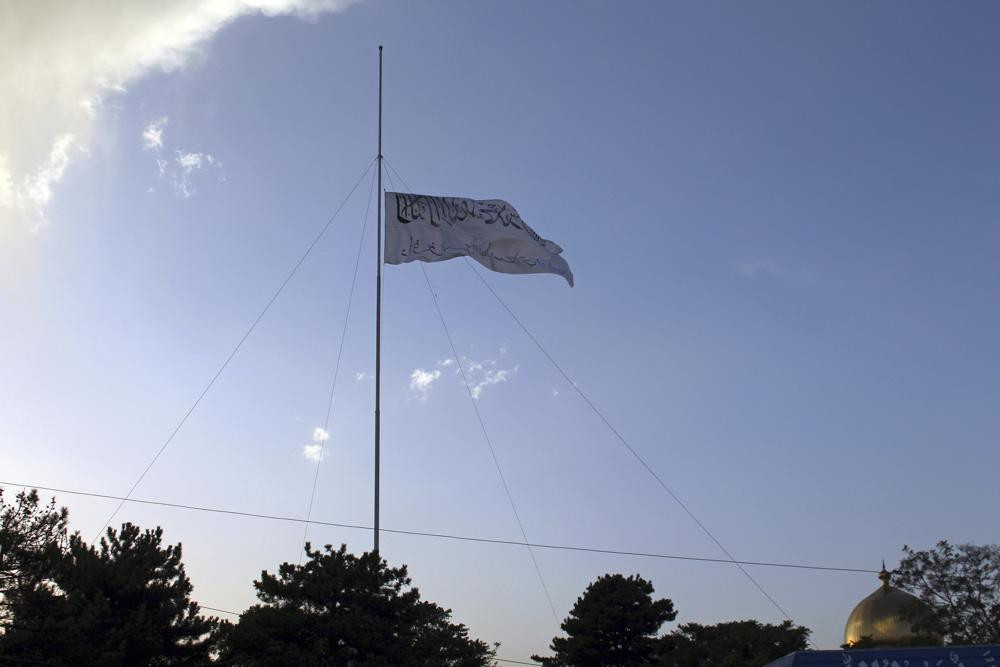 |
| Taliban flag at the residence of the governor of Ghazni province, located in southeastern Afghanistan on August 15. Photo: AP |
PV:Public opinion believes that if the US leaves Afghanistan, world powers and regional powers such as China, Russia, India, Pakistan and a series of other countries will step in to replace the US. What is your comment on the role of the superpowers after the US withdraws its troops?
Major General Le Van Cuong:On the global level, the withdrawal of US troops is what Russia and China want, because the presence of the United States in Afghanistan is not beneficial to them. Certainly, Russia has prepared a plan to gain influence and benefits in Afghanistan, and China must also have a clear strategy. Among the three global powers, I think China has a greater advantage than the US and Russia, shown in the fact that they have economic potential, with a surplus of thousands of billions of dollars - something that the Taliban really needs at this time. Besides, China has a strategic ally, Pakistan - a country that shares a border with Afghanistan, and has supported the Taliban for many years. In addition, in the past 5-7 years, Beijing has quietly invested economically in Afghanistan, something that neither the US nor Russia has been able to do. Up to now, they have a fairly solid economic investment base in the South Asian country.
At the regional level, India wants a permanent US military presence in Afghanistan to contain the infiltration of extremist jihadists from Central and South Asia into the country. In fact, the US withdrawal from Afghanistan is the biggest disadvantage for India. Sharing this view, Pakistan has an advantage over India because of its close relationship with the Taliban after 20 years of sponsoring this force.
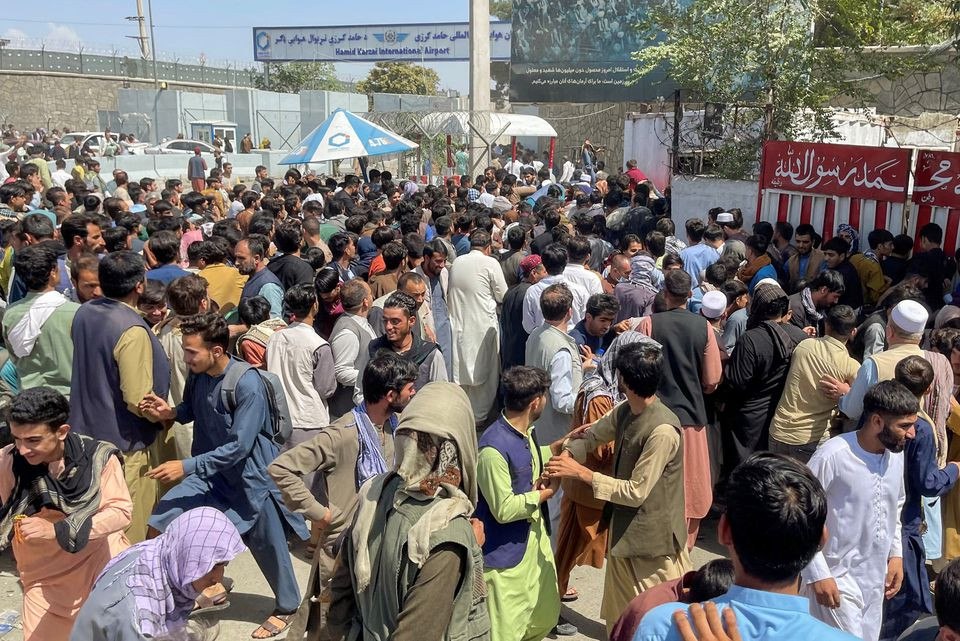 |
| Afghans jostle to enter Hamid Karzai airport in Kabul on August 16, as the Taliban take over the Afghan capital. Photo: Reuters |
PV:How does the Taliban's return to power in Afghanistan affect the region in particular and the world in general, Major General?
Major General Le Van Cuong:Commenting on who is happy and who is sad when the Taliban returns to power, perhaps the countries with a supportive attitude are Saudi Arabia and the United Arab Emirates, the Gulf countries... It should be noted that in the 90s of the last century, before the US attacked the Taliban, in addition to Pakistan, the above countries recognized the Taliban government while the whole world boycotted. Even Türkiye will not miss the opportunity to jump into Afghanistan. The most difficult is India, followed by Iran - where Sunni Islam is dominant. And so, the situation in the Middle East continues to be complicated after the US withdrew from Afghanistan.
Finally, the world picture will be as follows: In the Middle East, the US role will be reduced, China will strengthen its role through a firm foothold in Afghanistan, closely cooperating with the Arab world. China will have more opportunities and capital to confront the US, this will be a new front, a confrontation between two superpowers, if before the US was the master, now China will gradually replace the US.
PV:Ask forThanks, General!


